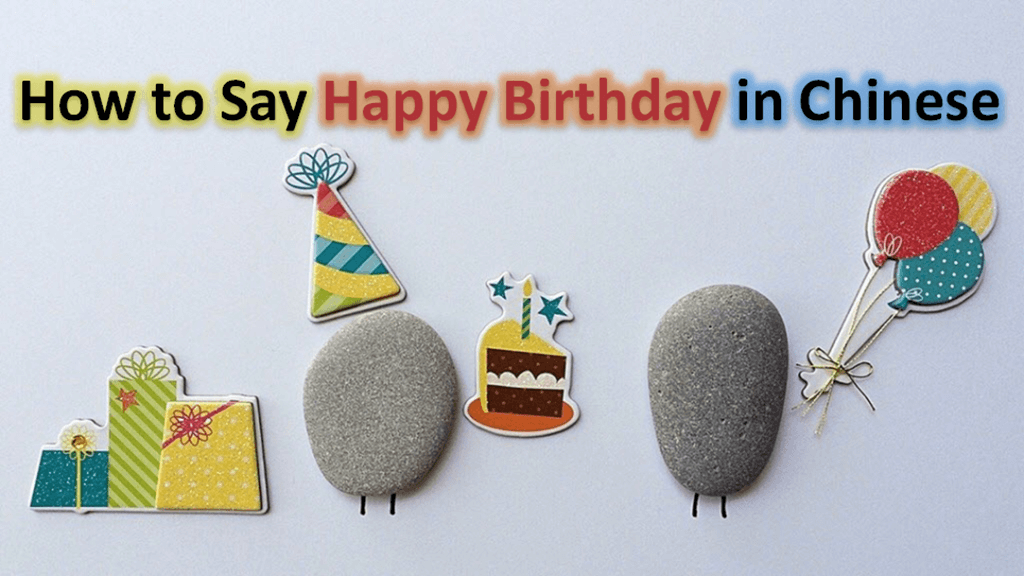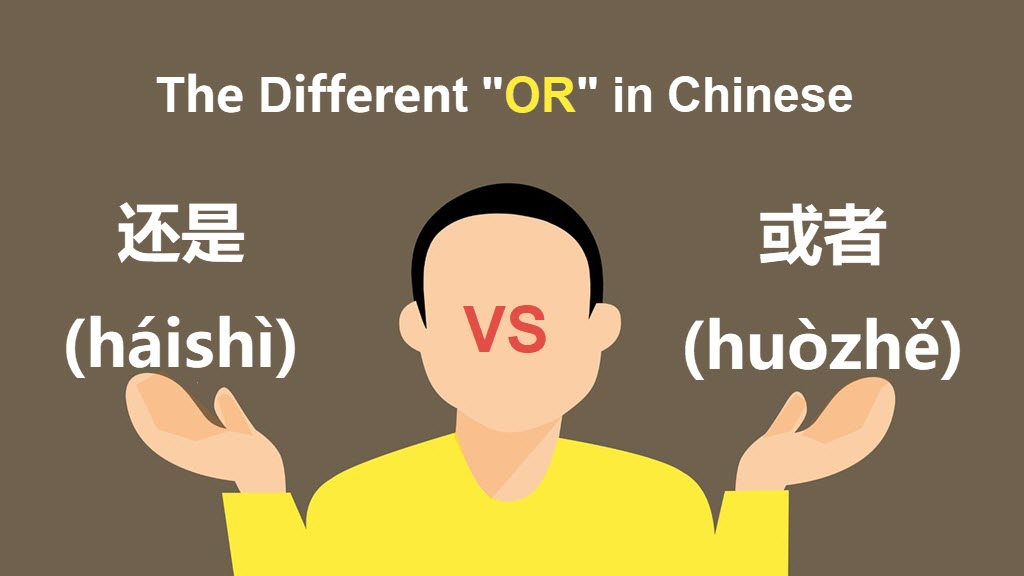
Birthday, as the name implies, refers to the day on which a person is born, and also refers to the anniversary of the date of one’s birth. It is pleasant to receive blessings and gifts from your family or friends on your birthday. But what should you do when your Chinese friend celebrates his or her birthday? Do you know how to say Happy birthday in Chinese? And do you know any Chinese birthday greetings? Take it easy. You will figure out the answers from this article.
Part 1. How to Say Happy Birthday in Chinese
When your family, friends, co-workers or others celebrate their birthdays, you will say “Happy birthday” in English. In Chinese, we will say “生日快乐(shēng rì kuài lè)” or “祝你生日快乐(zhù nǐ shēng rì kuài lè)”. If the birthday person is an elder, a superior or someone you respect, you can say 祝您生日快乐(zhù nín shēng rì kuài lè).
Sometimes you may be not able to say “生日快乐” in front of the birthday person, so you can use social media messages to express your best wishes. Speaking of social media, I’d like to share some Internet slang words which are popular among young Chinese people.
成长日嗨皮
Lit. Grow up day happy
破蛋日快乐
Lit. Hatch out of eggs day happy
出生日嗨皮
Lit. Birth day happy
破壳日嗨皮
Lit. Break out of shell day happy
生快
Lit. Birth happy
成长日, 破蛋日, 破壳日 and 出生日 all mean birthday as well as 生日. 快乐 means happy and 嗨皮 is the transliteration of happy. 生快 is short for 生日快乐. Some Chinese people also will say “Happy Birthday” in English to the birthday person. So you can just send a happy birthday in English to the birthday person. But if the person is an older Chinese, we seldom say “Happy birthday” in English to him or her.
In addition, if you say “生日快乐” to someone through the chat software or other social media, remember to do so at twelve o’clock the night before his or her birthday.
Part 2. Chinese Birthday Wishes or Greetings
It’s enough to impress your Chinese friend when you say “生日快乐(shēnɡ rì kuài lè)” to him or her fluently. But if you want to go any further, you can learn some phrases or idiomatic expressions for birthday wishes or greetings. However, the birthday greetings vary from person to person. Here we list some Chinese bday wishes that are suitable for old people, children, peers as well as female. Let’s take a look.
Wishes for Old People
For the elderly, we often wish them a long life, so we say
寿比南山
Live as long as the Zhongnan Mountains
祝你长命百岁
I hope that you live to be 100 years old
福寿双全
Enjoy both felicity and longevity
福如东海长流水,寿比南山不老松。
Your happiness comes in constantly like the water flowing into the Donghai Sea and your life lasts forever like the old pine always standing on the Nanshan Mountains.
Wishes for Children
For children, we hope that they will be healthy and study well, for example:
健康成长
Grow healthily
学习进步,
Good luck with your study
Wishes for Peers
For co-workers or superiors, we wish them success and wealth.
锦绣前程
Bright prospect
事业有成
Professional success
步步高升
Get promotion continuously
飞黄腾达
Your career takes off
财源广进
The money will come from all directions
财源滚滚
The money will be rolling in
Wishes for the Female
For ladies, we wish them young and beautiful, so you can say:
祝你永远十八岁
I hope you will always be eighteen.
越来越漂亮
Get more beautiful
General Chinese Greetings
Here we also list some commonly-used greeting words that you can use not only on birthdays, but also on festive occasions such as New Year’s greetings.
身体健康
To be in good physical condition
万事如意
I wish you every success
心想事成
Get what you want
一帆风顺
plain sailing
事事顺利
Everything is going smoothly
年年有今日,岁岁有今朝。
Wish you many happy returns of the day
天天开心
Wish you happy every day
Part 3. Sing Chinese Happy Birthday Song
Apart from saying birthday wishes in Chinese, you can also sing the Chinese version of the birthday song for the birthday person. The Chinese version of the birthday song shares the same tune with the English one, so you just need to be familiar with the lyrics.
祝你生日快乐
Happy birthday to you
祝你生日快乐
Happy birthday to you
祝(名字)生日快乐
Happy birthday, dear
祝你生日快乐
Happy birthday to you
Part 4. Chinese Taboos on Giving Gifts
In addition to verbal wishes, we also give birthday gifts to the birthday person. There is a Chinese saying that “礼轻情意重(lǐ qīng qíngyì zhòng)”. In English, it means that it's not the gift that counts , but the thought behind it. Before giving someone a birthday present, we should make clear the taboos in Chinese gift-giving. Some things must not be given away casually.
Clock or bell
The Chinese names of clock and bell are “钟(zhōng)”. “钟” is the homophonic of the Chinese character “终(zhōng)” which has the meaning of end or death. If you give someone a clock, it means you want him to die soon.
Pear
Pear is “梨(lí)” in Chinese. It shares the same pinyin with the Chinese character “离(lí)”. “离(lí)” means departure or abruption. Giving away pears means that you want others to be separated.
Candles, handkerchief and towel
Candles are used as offerings to the dead. Handkerchiefs and towels are often used as return gifts to mourners who give a gift of money at funerals. These three things reminds people of funeral, so they are not suitable as a gift.
Umbrella and fan
In Chinese, the pronunciation of umbrella is “sǎn” and the pronunciation of fan is “shàn”. Both words sound a lot like “散(sàn)” which also indicates separation. Thus, it’s best not to give umbrellas or fans as gifts.
Shoes
Shoe is pronounced as “xié” in Chinese, which is of the same pronunciation as “邪(xié)”. “邪(xié)” means evil and demo. So don’t give shoes to anyone other than your family.
Other taboos
In addition to the above, something that makes people think of bad things, such as white chrysanthemums, wind-bells, or green hats, should also not be used as birthday gifts. Besides, 4 is a taboo number in the eyes of Chinese people because it sounds like “死(sǐ)” which means death. So avoid the number 4 when you give a gift. And it is also best to avoid white and black when choosing the color of the gift.
Extra: Chinese Customs of Celebrating Birthday
In China, people generally attach more importance to the birthdays of the elderly and children. To celebrate the birthday of the elderly, their children will make birthday noodles and longevity peach for them to wish them a long life. To celebrate the birthday of children, their parents will give them a red envelope as a token of blessing. Whether it is the birthday of an elderly or a child, eggs are also indispensable they and are often red-dyed eggs. Eating eggs requires peeling off the eggshell, which means starting over again.
Birthdays are celebrated in different ways in different places. And influenced by Western culture, many young Chinese also choose to celebrate the birthday with cakes and candles. So don’t be surprised when you find that your Chinese friends don’t eat longevity noodles and eggs for their birthday.
Bottom Line
Now you have finished reading this article about how to say happy birthday in mandarin. We also introduce some Chinese birthday wishes, gift-giving taboos and birthday customs. Are you clear about all this? If you have any other questions or would like to share with us how your birthday is celebrated in your culture, welcome to comment below.





Comments